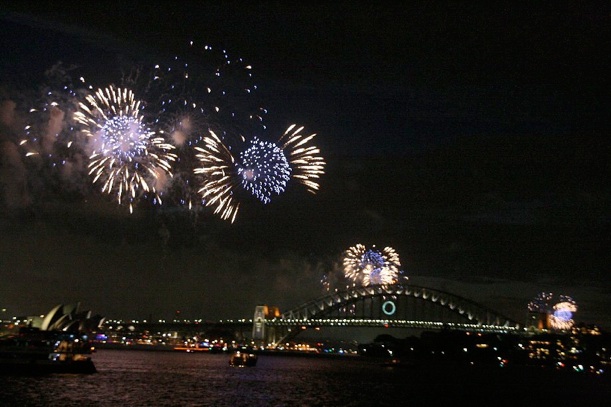A better future through education
Sunday, 3 January 2010
The photo at the top of this blog shows the New Year’s fireworks on Sydney Harbour that Di and I were privileged to experience a few days ago. One could not watch the fireworks and fail to be impressed with the vitality, the energy and the creativity displayed. As the theme of the carbon-neutral fireworks display was identified as ‘awaken the sprit’, I can only assume the intention was to revitalize the focus and initiative of the onlookers. It seemed to work well for me!
The beginning of a new year is always a good time to reflect on ‘the big picture’ and future directions. In his 1859 book, A Tale of Two Cities, Charles Dickens wrote “These are the best of times, these are the worst of times”. He wrote these words to set the scene for a story set in a time of turmoil and revolution, of hope and despair, of power and opportunity. The words may seem equally applicable in today’s world where, despite the fall of the Berlin Wall just over 20 years ago, the future often seems less secure than ever.
And yet, we live in a world where more food is grown per person that at any time in the history of humanity, where access to personal affluence and possessions has never been easier, and where information has never been freer, cheaper or more abundant thanks to the internet. At the College where I work in Hong Kong (LPCUWC), we have an educational environment that nurtures achievement of the highest IB scores in the world, where the staff to student ratio is one of the most generous in Asia, where highly motivated students learn in a quiet, clean, green, spacious environment and where care for the individual is a basic tenet of our philosophy. We have a College which is at the forefront of developing authentic international understanding, which is respected globally for its community service program, and which is the envy of nearby schools for the quality and breadth of its teaching program. Our College may not be heaven on earth, but it is indeed a very special place. I had a rush of visitors to our campus just before the end of last term, and it was extremely encouraging to hear the glowing comments from each and every one of them as they offered the perspectives of those who do not take the College for granted simply because they attend each and every day and know nowhere else.
As I try to do each year, I used my recent short holiday break in Australia to reflect upon the nature of education, our College and its special character. As I did so, I thought that perhaps more than any other type of enterprise, the outcomes of schools can only be measured and appreciated fully in the medium to long term. Short-term thinking is particularly dominant in Western societies, and it contrasts with Asian societies which have longer-term perspectives. I remember a media interview with Deng Xiaoping in the mid-1980s, shortly after agreement had been reached with the British to return Hong Kong to China in 1997. A Western reporter asked Deng Xiaoping whether he felt the ‘Hong Kong solution’ might also have applicability to Taiwan. Deng replied that he saw it as inevitable that Taiwan would return to China. When asked when this would happen, Deng replied ‘Oh, not too far into the future; certainly in the next four to five hundred years’.
The idea is not new; about 2500 years ago the Chinese philosopher Confucius commented that learning without thinking is futile; thinking without learning is dangerous. Happily, there is a global trend for schools to move away from narrow control-based practices to become performance-focused ‘learning organisations’ which encourage creativity, the healthy contention of competing ideas and long-term focus.
More than any other type of organisation, schools are well placed to become ‘learning organisations’. I believe that to be effective, schools must be ‘learning institutions’ that emphasise performance rather than control, and creativity rather than blame. A learning organisation:
•facilitates and promotes learning at all levels;
•transforms the organisation and an individual’s practices;
•demonstrates organisational and individual improvement;
•is able to adapt and lead change.
It used to be said that ‘if it ain’t broke, don’t fix it’. In essence, that old maxim is really just a recipe for mediocrity and second-best. As the author Michael Hough commented, ‘Good enough’ is not sufficient; and nor is ‘we are no better or worse than other similar organisations’. Just because something is working does not mean it is the best possible alternative. Nor does anything less than excellent constitute ‘authentic best practice’ which seeks to enhance long-term planning and creativity within a vision and articulated set of values. Too often, the good can be the enemy of the excellent.
And that leads me to the point of my thinking this week. We must not let the good of the present blind us to the excellence we could have in the future if everyone works together constructively. Schools should not be pale reflections of society. I believe that good schools exist to enlighten and equip students to play a positive role in their respective societies, because it is the quality of the students in today’s schools – their knowledge, their values, their skills and their attitudes – that will quite literally determine what society is going to be like in the next generation.











